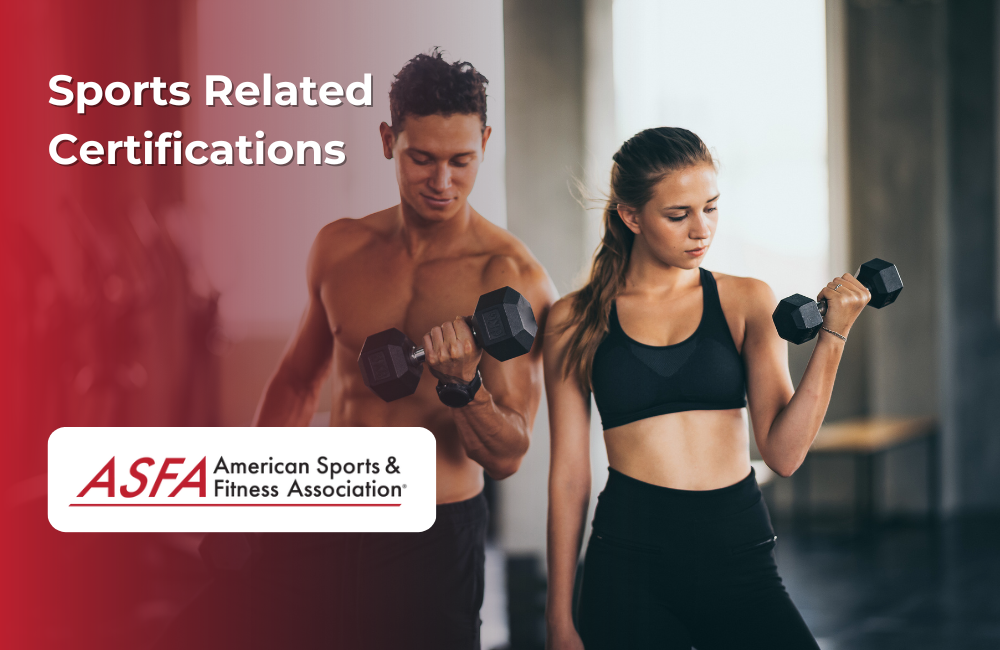Introduction
The fitness industry continues to expand with a variety of opportunities for professionals to specialize and grow. Students and fitness instructors can access a wide range of sports related certifications online, making it easy to fit learning into their schedules.
Sports related certifications are among the most valuable credentials a trainer can pursue, as they provide specialized knowledge to help athletes improve performance, reduce injuries, and achieve their goals. Certifications are available for different types of sports, including American sports such as those in the NFL, and for roles working with professional athletes.
These certifications cover a wide range of disciplines, from conditioning and strength training to nutrition and sport-specific coaching. Some certifications focus on athlete performance, performance assessments, and rehabilitation, while others emphasize business, branding, and health.
For fitness professionals, earning sports related certifications is an important step toward building credibility and carving out a meaningful career niche. Earning a certificate or multiple certificates can help coaches, trainers, and students determine the best job opportunities in the sports industry.
Some advanced certifications require a bachelor's degree or master's degree in exercise physiology or related fields.
Understanding the game and sport-specific coaching is a key focus of many certification programs.
Why Sports Certifications Matter
Sports certifications demonstrate advanced expertise in areas that directly support athletes. They provide trainers with the ability to design targeted programs, address sport-specific demands, and implement safe, effective techniques. For clients, knowing their coach holds relevant certifications builds trust and confidence in the training process. For trainers, these credentials open doors to more specialized career opportunities and increase professional recognition.
Benefits of Sports Related Certifications
Pursuing certifications in sports and athletic performance brings many advantages:
-
Enhanced credibility as a knowledgeable fitness professional
-
Expanded career opportunities with athletes and teams
-
Specialized skills to design effective sport-specific training programs
-
Increased confidence in coaching across a variety of sports
-
The ability to prevent injuries and improve recovery strategies
-
Greater client satisfaction through improved athletic performance
Types of Sports Related Certifications
There are different types of sports-related certifications, each catering to specific career paths and professional development within the industry. Common types include:
-
Strength and conditioning certifications that develop power, speed, and endurance
-
Sports performance certifications that emphasize agility, coordination, and biomechanics
-
Sport-specific certifications such as those for golf, running, or triathlon training
-
Nutrition certifications that provide athletes with guidance on fueling and recovery
-
Coaching certifications that combine leadership with fitness expertise, often focusing on understanding the game and developing coaching skills
-
Certifications in exercise physiology, which provide a scientific foundation for training and performance
-
Certifications offered by fitness associations for fitness instructors and coaches, ensuring industry-recognized credentials
-
Certificates in sports analytics and programming for those interested in data-driven roles and technical expertise
Each type of certification enhances a trainer’s ability to serve athletes with unique and specialized needs. Earning certificates from recognized organizations can also enhance a trainer's credibility.
Accreditation and Reputation
Choosing a certification from a reputable organization not only validates your expertise but also assures employers and clients that you possess the essential skills and knowledge required for success in sports medicine and fitness. Programs are designed to provide comprehensive education in exercise, training, and sports science, equipping trainers with the tools needed to excel in a competitive industry. By prioritizing reputation, you can gain a strong foundation for your fitness career and ensure your credentials are recognized across the industry.
Program Requirements
The requirements for sports-specific training certifications can vary depending on the certifying agency and the particular certification you wish to pursue. Most programs require candidates to meet certain eligibility criteria, which often include a background in exercise science or a related field, completion of relevant educational programs, or prior experience as a personal trainer.
Other certifications may require candidates to already hold a current certification and to complete a set number of continuing education hours. Understanding these requirements is essential for anyone interested in advancing their career in sports training, as meeting the eligibility criteria is the first step toward completing a recognized certification program. By carefully reviewing the prerequisites for each program, you can ensure you are prepared to successfully complete your chosen certification and take the next step in your professional journey.
Program Format
Sports-specific training certification programs are designed to accommodate a variety of learning preferences and schedules, making it easier for aspiring professionals to pursue their education. Many certifying agencies offer online courses that allow you to complete your studies at your own pace. These online programs typically feature video lectures, interactive modules, and practice exams, providing a thorough education in sports medicine, exercise science, and training programs.
Continuing Education
Continuing education can be achieved through a variety of methods, including attending workshops, enrolling in online, or participating in specialized professional development programs. These opportunities not only help you maintain your certification but also expand your knowledge, skills, and expertise, allowing you to offer the highest quality services to your clients. By staying engaged with continuing education, you demonstrate your commitment to professional growth and ensure that your abilities remain at the forefront of the fitness industry.
Career Opportunities with Sports Certifications
Certified professionals can pursue careers in gyms, sports performance centers, schools, or with athletic teams. Many also provide private or online coaching to athletes seeking personalized support. With more athletes and fitness enthusiasts prioritizing performance, demand for trainers with sports certifications continues to grow. This creates a wide range of opportunities for professionals who pursue this path.
Tips for Choosing the Right Certification
Selecting the right certification depends on career goals and areas of interest. Trainers should:
-
Identify the sports or populations they want to work with
-
Consider whether they prefer group training, team environments, or one-on-one coaching
-
Evaluate the areas of expertise that will enhance their current career
-
Plan for continuing education to expand into additional certifications over time
By choosing strategically, trainers can align their certifications with both personal interests and market demand.
Conclusion
Sports related certifications provide a powerful way for fitness professionals to expand their skills, enhance credibility, and make a lasting impact on athletes. By pursuing specialized knowledge in areas such as strength, conditioning, nutrition, or sport-specific coaching, trainers can offer services that elevate performance and improve safety. For those seeking to grow their careers, these certifications represent a valuable investment in both professional development and client success.
FAQs
What are sports related certifications?
They are professional credentials that qualify trainers to coach athletes in specific areas such as conditioning, nutrition, or sport-specific skills.
Why should a trainer pursue sports certifications?
They enhance credibility, expand career opportunities, and provide the knowledge to design targeted athletic training programs.
What types of certifications are available?
Options include strength and conditioning, performance training, sport-specific coaching, and nutrition-focused certifications.
Who benefits from a trainer with sports certifications?
Athletes of all levels, from beginners to professionals, benefit from specialized coaching that improves performance and reduces injury risks.
Where can certified trainers work?
They can work with athletic teams, in gyms, performance centers, schools, or provide private and online coaching services.





